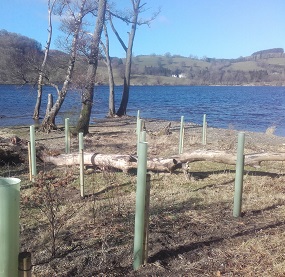
A team of National Park volunteers and rangers were joined by around 50 John Muir Award students last week to plant more than 200 trees on the Ullswater lakeshore near Pooley Bridge. This was part of a scheme aimed to add ecological value and reduce the threat of flooding.
Along with the many benefits trees provide, the roots will help stabilise the ground to reduce erosion and lower the risk of flooding in the area. The tree species; aspen, willow, alder and crab apple, were recommended by Natural England and kindly donated by The Woodland Trust. In time, they will create future nesting sites and a vital source of food for wildlife.
Lake District National Park Flood Ranger, Nick Hall, said that the mature alder trees present were dying, leaving the lake shore area and the Ullswater Way footpath vulnerable to erosion and flooding. In support of this, a concerned farmer agreed the works and stepped forward to help.
Nick explained “We used peat-free compost made from locally sourced pot-ash rich bracken harvested from the fells above the site, which is then combined with Herdwick wool by Dale Foot compost. This ingenious compost was kindly donated and will give the trees a much better start on this exposed site, where the ground is short of nutrients.
“The communities around Ullswater have unfortunately seen the effects of flooding first hand, so it was fantastic to work alongside local businesses, farmers and landowners together with students on such a rewarding and important project. We look forward to seeing the trees grow and hope the users of the Ullswater Way will benefit from the trees and enjoy the wildlife in years to come.”
With special thanks to:
The Outward Bound Trust, Dalefoot Compost and The Woodland Trust, for their kind donations and help which made the scheme possible.
Photo shows completed tree planting work on the shore at Ullswater.